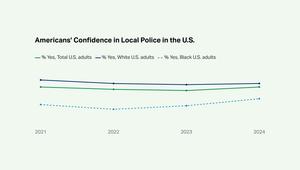Story Highlights
- Two-thirds prefer focusing more on social problems than on law enforcement
- About six in 10 oppose using National Guard or military troops to combat urban crime
- Support for treating juvenile offenders like adults has declined further
WASHINGTON, D.C. — Gallup’s 2025 update of its annual Crime poll assessed U.S. adults’ general philosophy on crime control as well as five prominently discussed approaches to tackling crime. These include the death penalty, treating juveniles who commit violent crimes as adults, holding parents responsible when their children use family-owned guns in a crime, and deploying either the National Guard or military troops to cities to help control crime.
Taken together, the Oct. 1-16 results indicate that Americans as a whole lean toward moderation in the use of law enforcement to combat crime, but that the country is also sharply divided, politically, over these policies.
To Lower Crime, Americans Prioritize Addressing Social Problems Over Enforcement
The clearest indication of Americans’ approach to crime fighting comes from a question asking whether more government money and effort should go toward addressing some of the societal problems that may lead to crime or toward strengthening law enforcement.
Currently, 67% favor focusing on “addressing social and economic problems such as drug addiction, homelessness and mental health,” while 29% believe more resources should be devoted to “strengthening law enforcement.” This balance of views is consistent with the two prior readings on this question, from 2023 and 2020, both of which show more than six in 10 Americans preferring to stop crime before it starts.
Gallup asked questions similar to this from 1989 through 2010, and these also showed the preponderance of Americans thinking more money and effort should go toward “attacking the social and economic problems that lead to crime through better education and job training” than toward “deterring crime by improving law enforcement with more prisons, police and judges.”
Majority Opposes Use of Military or National Guard in Cities
Americans’ resistance to vigorous law enforcement is also evident in their opposition to deploying troops from either the National Guard or the U.S. military to control crime in U.S. cities.
Roughly six in 10 Americans oppose both ideas, which President Donald Trump has proposed or implemented in his second term for certain cities.
- 60% are against sending military troops to cities to control crime, while 39% favor doing so.
- 56% oppose sending National Guard troops to U.S. cities, while 41% are in favor.
Partisan differences are wider on these uses of troops than for any other crime policies tested in the survey, with more than eight in 10 Republicans versus only 5%-10% of Democrats favoring each.
Growing Support for Juvenile Court Over Adult Sentencing
Public attitudes toward how the justice system should treat juvenile offenders had already softened in 2023 compared with the early 2000s, and they shifted further in the latest poll.
Just 41% of Americans now say minors aged 14 to 17 who commit violent crimes should be treated the same as adults, down from 46% in 2023, 59% in 2003 and 65% in 2000. Conversely, the percentage saying minors should instead be given more lenient treatment in a juvenile court has risen to 50%, about double what it was in 2000.
The decline in support for treating juveniles as adults has been driven by Democrats’ and independents’ support falling by at least half. Republicans, by contrast, have shown little change in their views since the early 2000s, with between 59% and 67% in favor.
Broad Support for Holding Parents Accountable for Gun Misuse
Separately from how they think juvenile offenders should be handled, the large majority of Americans say they would generally favor a law holding parents legally responsible if their children commit crimes with the parents’ guns.
Currently, 73% support such a law, little changed from 69% when Gallup last measured this in 2000. Only 22% oppose the policy, while 4% are undecided.
Bare Majority Still Favors the Death Penalty
The percentage of Americans who favor the death penalty for people convicted of murder has been steadily declining over the past three decades, falling from a peak of 80% in 1994 to 52% today. While statistically similar to the 53% recorded in each of the past two years, this year’s support level is the lowest in Gallup’s death penalty trend since 1972, when 50% were in favor.
Current support for the death penalty is below where it stood in Gallup’s first measurement, in 1936, when 59% backed it as the punishment for murder. Majorities of Americans have continued to support the death penalty throughout the trend, except for most readings between 1957 and 1971, a period when the U.S. Supreme Court considered a series of legal challenges to state death penalty laws.
Earlier Gallup reports have shown that the decline in public support for the death penalty since at least the early 2000s is largely due to fewer Democrats and independents being in favor, as well as reduced support from younger generations, particularly millennials.
Republicans, Alone, Back Stringent Law Enforcement Measures
While majorities of all partisan groups, between 71% and 77%, support parental accountability in cases of gun misuse by minors, Republicans diverge sharply from Democrats and independents on the other five crime-related policies measured in the latest survey.
- National Guard or Military Use: The largest party differences are for use of National Guard or military troops for controlling crime in cities — more than 80% of Republicans versus no more than 10% of Democrats support these proposals.
- Law Enforcement vs. Social Programs: A smaller majority of Republicans (63%) versus just 8% of Democrats prefer emphasizing increased law enforcement rather than addressing socioeconomic problems as the better general solution to crime — a 55-percentage-point party gap.
- Death Penalty: There is a 49-point gap between the major party groups over the death penalty, with 81% of Republicans and 32% of Democrats in favor.
- Juvenile Sentencing: The parties diverge less on support for treating juveniles who commit violent crimes like adults (65% of Republicans vs. 27% of Democrats favor this), but they are still on opposite sides of the issue.
The views of independents are closer to those of Democrats than Republicans on all five policies where the major parties disagree, with less than half of independents favoring any of them.
In line with these partisan differences, support for stringent law enforcement policies is greater among more Republican-leaning demographic groups — men, White adults and older Americans — than it is among their more Democratic counterparts, including women, people of color and younger Americans.
Bottom Line
With support for the death penalty at a half-century low and Americans continuing to favor addressing root causes of crime over expanding law enforcement, most U.S. adults oppose militarized responses to urban crime and reject treating juvenile offenders as adults. The views on parents’ accountability for their children’s misuse of family-owned guns are an exception, receiving bipartisan backing.
These preferences reflect a broader public inclination toward moderate, preventive approaches to crime reduction over stringent sentencing and enforcement at a time when Americans are less concerned about the U.S. crime problem than they’ve been in recent years.
Stay up to date with the latest insights by following @Gallup on X and on Instagram.
Learn more about how the Gallup Poll Social Series works. View complete question responses and trends (PDF download).




